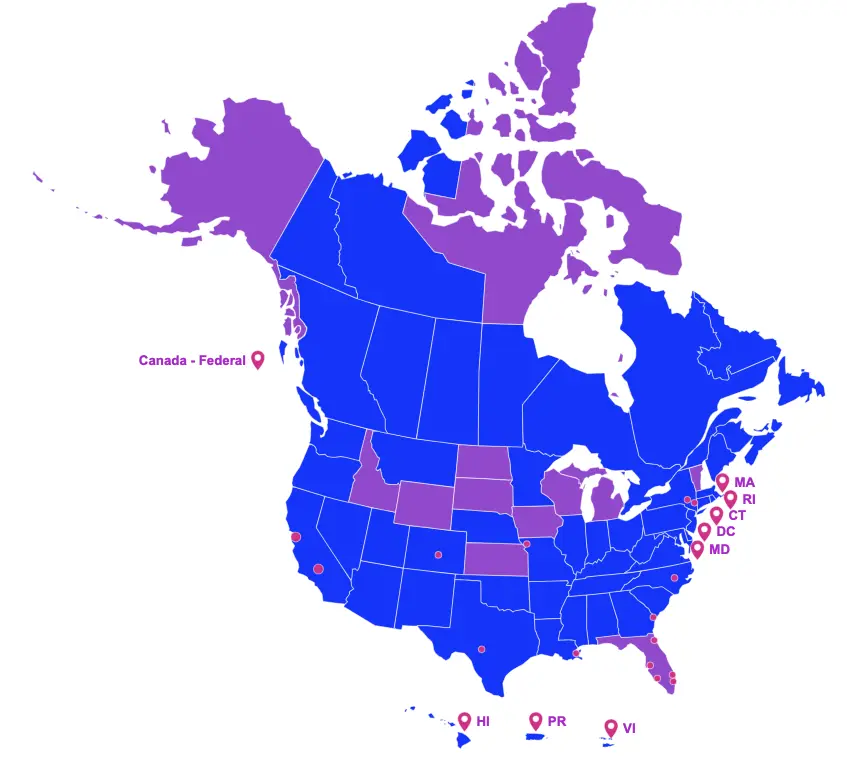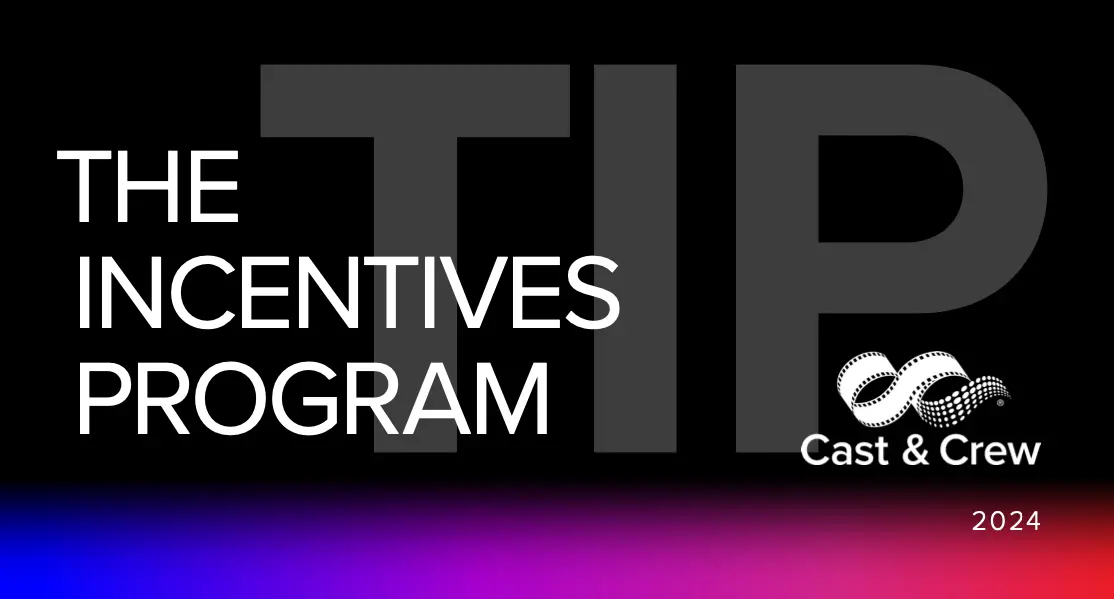THE INCENTIVES PROGRAM - TIP
A first look at our newsletter.
Cast & Crew Financial Services (CCFS) offers both U.S. and Canadian production incentive management services from setup to audit, as well as production incentive financing.
PROPOSED LEGISLATION
Still in the House or Senate
Florida (S 704)
Senate Bill 704 proposes to establish the Florida Film, Television, and Digital Media Targeted Rebate Program. Details of the program are as follows:
- Creates a rebate of up to twenty percent of qualified expenditures for projects that provide the highest return on investment and economic benefit to the state;
- An additional three percent may be earned (for a total not to exceed 23%) if 75% of the project’s production in Florida takes place in an underutilized area or if its content is deemed “family friendly”;
- Qualifies expenditures incurred in Florida as well as the 1st $200,000 paid to each resident;
- Establishes a per project incentive cap of two million dollars;
- Requirements:
- Project must have a minimum spend of:
- At least $1.5 million in qualified production expenditures for a qualifying film or digital media project; or,
- At least $500,000 per episode in qualified production expenditures for a television project;
- For TV series, has a minimum of 7 episodes;
- For a reality program or series, has at least 10 episodes;
- Project that at least 60% of the cast and crew, including stand-ins but not extras, will be made up of Florida residents;
- At least one member of the cast and crew must be a military veteran;
- Project to spend at least 70% of its production days in Florida;
- Provide the results of an audit of qualified production expenditures performed by an independent certified public accountant that is a resident of Florida;
- Production company must not receive a sales tax exemption certificate;
- Begin principal photography in Florida within the period beginning 30 days before and ending 90 days after the project’s listed production start date;
- Include “Filmed in Florida” or “Produced in Florida” logo in the end credits;
- Must make a good faith effort to use in-state providers and employ cast and crew who are residents of Florida; and,
- Project must have a minimum spend of:
- Establishes a sunset date of June 30, 2025.
Hawaii (H 1174) and (S 921)
House Bill 1174 and Senate Bill 921 propose to amend the Hawaii Motion Picture, Digital Media, and Film Production Income Tax Credit program as follows:
- Reduces the state annual funding cap from $50 million to $45 million per calendar year;
- Amends the per project incentive cap from $15 million per project to $12 million per taxable year;
- Limits the amount of above-the-line costs used to claim a credit for a qualified production to $2 million per taxable year;
- Requires qualified productions claiming a credit greater than $5 million to provide evidence that at least 75 per cent of production was filmed in Hawaii;
- Requires that a qualified production claiming credits in an aggregate amount in excess of $15 million in two taxable years and claiming above-the-line costs in excess of $3 million during the same period, enter into an agreement to provide Hawaii with 0.25 per cent of all worldwide gross revenues of the qualified production;
- Reduces the minimum spend requirement from $200,000 to $50,000;
- Defines a “qualified vendor” as:
- An entity incorporated or organized in Hawaii for no less than five years; and,
- All principals of the entity are state income taxpayers; and,
- Extends the sunset date from December 31, 2025 to December 31, 2032.
If passed, the Act shall take effect immediately.
Hawaii (H 637)
House Bill 637 proposes to amend the Hawaii Motion Picture, Digital Media, and Film Production Income Tax Credit program as follows:
- Reduces the per project incentive cap to $12.5 million, previously $15 million; and,
- Reduces the annual funding cap to $45 million per calendar year, previously $50 million.
If passed, the Act shall take effect July 1, 2021.
Hawaii (H 843)
House Bill 843 proposes to amend the Hawaii Motion Picture, Digital Media, and Film Production Income Tax Credit program as follows:
- Extends the sunset to December 31, 2035, previously December 31, 2025.
If passed, the Act shall take effect July 1, 2021.
Hawaii (H 845)
House Bill 845 proposes to amend the Hawaii Motion Picture, Digital Media, and Film Production Income Tax Credit program as follows:
- Eliminates the per project incentive cap, previously $15 million; and,
- Eliminates the annual funding cap, previously $50 million.
If passed, the Act shall take effect immediately.
Hawaii (H 846)
House Bill 846 proposes to amend the Hawaii Motion Picture, Digital Media, and Film Production Income Tax Credit program as follows:
- Eliminates the per project incentive cap, previously $15 million; and,
- Increases the annual funding cap to $110 million per calendar year, previously $50 million.
If passed, the Act shall take effect immediately.
Missouri (S 367)
Senate Bill 367 proposes to establish the Show Missouri Film and Digital Media Act. Details of the program are as follows:
- Creates a transferable tax credit equal to:
- 25% of “qualifying in-state” costs including resident labor:
- Does not include any amounts paid to a resident earning more than $250,000 in compensation and wages;
- 10% on nonresident labor:
- Does not include any amounts paid to a nonresident earning more than $250,000 in compensation and wages;
- Allows for an additional credit of 5% on all qualified spend if at least 50% of the qualified film production is filmed Missouri;
- Allows an additional credit of 5% on all qualified spend if the Department of Economic Development (DEcD) determines the script positively markets a city or region of Missouri, the entire state, or a tourist attraction located in the state;
- 25% of “qualifying in-state” costs including resident labor:
- Establishes an annual funding cap of $4.5 million per calendar year;
- Project requirements:
- Minimum spend of:
- More than $50,000 for projects with a run-time of less than 30 minutes;
- More than $100,000 for projects with a run-time of more than 30 minutes;
- Include an end credit logo provided by the DEcD;
- Limits a production company to one qualified film production project per year; and,
- Minimum spend of:
- Establishes a sunset date of December 31, 2027.
New York (A 3009) and (S 2509)
Assembly Bill 3009 and Senate Bill 2509 propose to amend the Empire State Film Production Tax Credit program as follows:
- Extends the sunset date and funding of the program from December 31, 2025 to December 31, 2026; and,
- Requires that a television pilot that applies on or after April 1, 2021 have a minimum budget as follows:
- $1 million if the majority of shooting days are in Westchester, Rockland, Nassau, or Suffolk county, or within the five New York City boroughs; or,
- $250,000 if the majority of shooting days takes place in any other county within New York.
If passed, the Act shall take effect immediately.
Oregon (S 43)
Senate Bill 43 proposes to extend the sunset date of the labor rebate thru December 31, 2029.
Utah (S 167)
Senate Bill 167 proposes to amend the Utah Motion Picture rebate program as follows:
- Increases the annual state funding cap to $15 million per fiscal year (7/1 – 6/30), previously $6.79 million.


